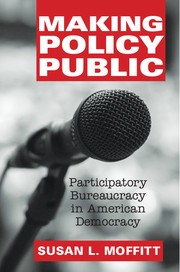Book contents
- Frontmatter
- Dedication
- Contents
- List of Figures
- List of Tables
- Preface
- Abbreviations
- 1 Portals of Democracy in American Bureaucracy
- 2 Participatory Bureaucracy in Practice
- 3 The Development of Public Committees
- 4 Making Educational Performance Public
- 5 Private Knowledge for Public Problems
- 6 Setting the Public Agenda
- 7 Deliberate Participation
- 8 The Impact of Public Advice
- 9 Participatory Bureaucracy in American Democracy
- Appendix
- Bibliography
- Index
- References
9 - Participatory Bureaucracy in American Democracy
Published online by Cambridge University Press: 05 October 2014
- Frontmatter
- Dedication
- Contents
- List of Figures
- List of Tables
- Preface
- Abbreviations
- 1 Portals of Democracy in American Bureaucracy
- 2 Participatory Bureaucracy in Practice
- 3 The Development of Public Committees
- 4 Making Educational Performance Public
- 5 Private Knowledge for Public Problems
- 6 Setting the Public Agenda
- 7 Deliberate Participation
- 8 The Impact of Public Advice
- 9 Participatory Bureaucracy in American Democracy
- Appendix
- Bibliography
- Index
- References
Summary
Access to competent advisors and good advice through sound management practice should create a wiser President, more confident and effective top executive branch officials, a Congress more knowledgeable in performing its legislative functions, and a citizenry more alert to the problems of the time.
Committee on Government Operations, House Report 91–1731, The Role and Effectiveness of Federal Advisory Committees, December 11, 1970This book set out to analyze participation from the perspective of bureaucratic task implementation. I did so to consider the implications of public participation for the enduring puzzle of how to reconcile bureaucratic capacity with democratic accountability. Engaging the public in policymaking with the aim of producing “better” outcomes may not be surprising from the perspective of democratic theory, but it fundamentally challenges traditional conceptions of public bureaucracy. Whereas democratic accountability is associated with openness, bureaucratic capacity is traditionally associated with closure. Another form of this dichotomy focuses on power: closure means power for the bureaucrats, whereas openness and participation cede power to someone else. More of one yields less of the other, and thus a trade-off ensures, conventional bureaucratic theory suggests.
But if public participation is an alternative to bureaucracy or a fundamental threat to bureaucratic power, why do bureaucrats open their doors to participation? When considering federal-level public committees over the past 100 years, evidence suggests that bureaucrats do a lot of door opening: considerable public participation has resulted from government agency initiative, not necessarily because Congress or the president require it or induce it. Bureaucrats – before and after the passage of the Federal Advisory Committee Act – have gone to great lengths to make public participation happen. Critics of public participation in agency policymaking point to bureaucratic door opening as merely a way to manipulate the public or to obtain a rubber stamp for preferred policies. The FDA case, however, stands boldly against the manipulation–rubber stamp critique: public participation through FDA drug review committees is associated with higher-quality policy outcomes manifested through safer drug post-marketing experiences and less frequent investigations of agency impropriety. In the right conditions, public participation yields not just better policy outcomes but better bureaucracy. Public participation is not necessarily bureaucracy’s opposite but instead can be its complement.
- Type
- Chapter
- Information
- Making Policy PublicParticipatory Bureaucracy in American Democracy, pp. 225 - 236Publisher: Cambridge University PressPrint publication year: 2014



